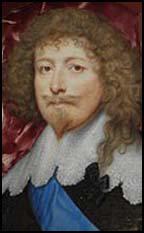Edward Sackville

Edward Sackville, the son of 2nd Earl of Dorset, was born in 1590. As a young man he became involved in a scandal. In 1613, at the age of 23, Edward Sackville and Lord Edward Bruce both fell in love with a woman called Venetia Stanley. The two men decided to fight a duel to decide who should become her husband. To avoid the king's punishment, Sackville and Bruce travelled to Bergen in Holland to fight the duel. Lord Bruce was killed in the duel but this did not win Sackville his bride. When he arrived back in England he discovered that Venetia Stanley had decided to marry Sir Kenelm Digby.
Sackville was forgiven by James for killing Lord Bruce and the following year was allowed to represent Sussex in the House of Commons. After the death of James I Sackville loyally served Charles I. In 1623 Sackville was Governor of Bermuda and in 1631 helped administer the British settlement in Virginia, America.
When Edward Sackville became the 4th Earl of Dorset in 1624, he supported the king's policies in the House of Lords. When Puritans rioted against the influence of the Bishops in 1641, Edward Sackville took charge of the the Middlesex militia and ordered them to fire on the protesters. This upset the Puritans in the House of Commons and attempts were made to have him arrested.
Charles I protected the Earl of Dorset against the Puritans and on 4th January 1642, Charles I sent his soldiers to arrest John Pym and other leading radicals in Parliament. After failing to arrest Pym, the king fled from London and aware that a Civil War was inevitable, began forming an army.
The Earl of Dorset and his two sons, Richard and Edward, joined the king's army at York in January, 1642. In August the Earl of Dorset was sent to meet the leaders of Parliament in an attempt to negotiate an end to the conflict. The negotiations were unsuccessful and soon afterwards the Parliamentary army took possession of Knole House, the Earl of Dorset's home in Sevenoaks. The house was ransacked and a great deal of property was stolen.
The Earl of Dorset took part in the Battle of Edgehill in October 1642. His sons also took an active role in the Civil War. Richard, the eldest son was taken prisoner at Mile End Green when the Royalist army attempted to march on London. The younger brother, Edward, was wounded at Newbury and later taken prisoner at Kidlington near Oxford. Edward died on 11th April, 1646 while a prisoner of the Parliamentary army. It was later claimed that Edward had been murdered by one of Cromwell's soldiers.
After the execution of Charles I on 30th January, 1649, the Earl of Dorset retired to his home in London and stayed there until his death in July, 1652. Edward Sackville, 4th Earl of Dorset was buried in the family vault at Withyham.
Oliver Cromwell refused permission for Edward's son Richard to inherit his father title. Some of his property was also seized as punishment for fighting for the royalist army against Parliament. However, when the monarchy was restored in 1660, Charles II restored Richard's title.
Primary Sources
(1) Edward Sackville, letter written in 1613.
We commanded our doctors to withdraw a pretty distance from us... There in the meadow (ankle-deep in water) we removed our doublets and we began to charge each other... I made a thrust at my enemy, but was short; and, in drawing back my arm, I received a great wound... In revenge, I pressed it to him, but I missed him... I then received a wound which passed through my body, and almost to my back... we then wrestled for the two greatest and dearest prizes we could ever expect, our honour and our life... with a kick and a wrench I freed my long-captive weapon and held it at his throat. I demanded that he should ask for his life... he bravely refused... Myself being wounded, and feeling faint because of a loss of blood... I struck at his heart, but I missed my aim... drawing back my sword, I repassed it through him in another place.. I easily became master of him, laying him on his back... His surgeon cried out that Lord Bruce would die if his wounds were not treated! I asked him again if he would request his life... He scorned it! I could not find in my heart to offer him any more violence... I retired to my surgeon.... Lord Bruce later died.
